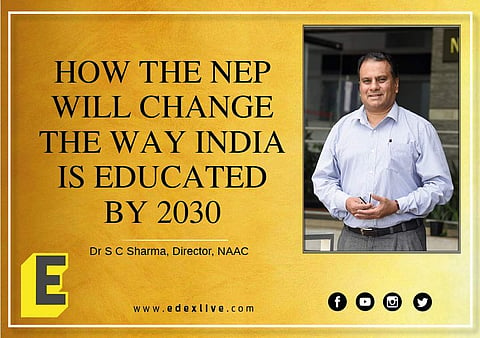

A complete overhaul of the education system was long overdue and the NEP could not have come at a more opportune time, when India is surging to emerge as a global superpower. The stupendous success and whole-hearted acceptance of the National Education Policy comes in the wake of its intent to transform education from a centralised, rigid, standardised, content-based, exam centric system to a holistic, multi-disciplinary, flexible, skill-based framework.
In a bid to enhance the overall governance of the higher education system, the policy has instituted a single regulatory body for the entire higher education system, namely, the Higher Education Council of India (HECI) comprising four verticals with clearly demarcated roles and functions: The National Higher Education Regulatory Council (NHERC) is the sole regulator for the HES, excluding medical and legal education, National Accreditation Council (NAC) monitors the system of education; the Higher Education Grants Council (HEGC) is responsible for financing institutions, and, the General Education Council (GEC) will frame the learning objectives and outcomes of higher education programs.
Hitherto, the education system with its skewed focus on the various stakeholders, had resulted in the student community being a neglected and confused lot. With NEP, the system has finally realigned itself to cater to the needs of its chief stakeholders — the students. Significantly, the reins of the transformation are now in the hands of the teacher, which makes the change truly intrinsic and organic. Having accorded teachers with this special status, the NEP has created a robust framework to empower teachers with opportunities for mentorship, teacher training and continuous learning. Besides, to attract the best minds, a clear trajectory for career development of teachers towards institutional headship is a highlight.
The NEP has initiated a 360-degree transformation with a focus on 21st-century skills in pedagogy, course structures and assessment, to achieve the 2030 agenda of Sustainable Development. Moving away from the rote-based learning system of cramming information for exams, education will now focus on strong conceptual understanding, creativity, lateral and critical thinking to prepare students for the job profiles of the future.
Higher Education has been given a much-needed makeover in the NEP with an emphasis on strengthening high quality research capacity with the establishment of the National Research Foundation. It also aims at building world-class institutions on the lines of IITs. Besides, to propel the education system towards a multidisciplinary approach, stand alone professional universities will integrate and offer multi-disciplinary course structures. The policy paves the way for flexible curricula, creative combinations of subjects, integration of vocational education and multiple entry and exit points with appropriate certification to cater to a wide spectrum of students from varying socio, cultural and economic backgrounds.
Another good thing is that the affiliation system with universities will be gradually phased out under the NEP. Institutions can now award degrees independently. NEP proposes to replace the statutory bodies in universities with a Board of Governors to eliminate long-pending positions for faculty members which remain vacant for years on end. The Board will ensure governing body members and faculty members are appointed immediately so the institution and students stand to benefit. NAAC, the official accreditation and assessment body will henceforth be assisted by other agencies supporting it in its various roles and functions.
Perhaps the most important step towards modernising the Indian education system is the accent given in the NEP to harnessing technology to the maximum in education delivery. Incorporating technology to transform learning, teaching, assessment and administration will provide flexibility and transparency to the system.
The new system, above all will instill a love for learning among students who will graduate as self-motivated learners with a new and creative perspective to tackle the challenges of everyday living. Learning will now be closer to lived experiences of children from emotional management to handling stress to imbibing holistic lifestyles.
The NEP is futuristic and transparent, and if implemented with commitment and passion, it will make the Indian Higher Education System worthy of being emulated. It is certainly set to catapult India into a global destination for higher education. With the implementation of the policy, India will also see a substantial drop in students opting for foreign universities for higher education. The flexibility and for a country that is so diverse and rich will only result in an unprecedented surge in the GER. With the reforms introduced by NEP, the goal of achieving a 50% GER by 2035 is now realistic and practical.
Let’s not forget our rich heritage. The Indian Higher Education system has a haloed past. Nalanda and Takshashila Universities, in the 5th and 6th centuries, were the highest centres of learning in the world. These are our benchmarks. And if we have to reach anywhere near them, constant innovation and tireless pushing of our quality standards is imperative. These universities of yore attracted students and scholars from all over the world, by virtue of their erudite and eminent scholars and the high quality of education they offered. Ancient India, thanks to these universities, was a much sought after hub for higher education. There is no doubt that with the implementation of NEP 2020, the Indian Higher Educational System will be infused with strength and rigour and help us reach those standards to make India a destination for higher education again.
Professor S C Sharma is Director, National Assessment and Accreditation Council (NAAC). Views expressed here are the author's own
